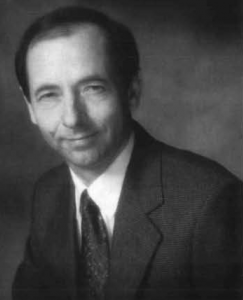
The early death of Tony Raine has deprived British nephrology of one of the outstanding intellects of his generation. His main contribution lay in focusing upon the appallingly high rate of death from cardiovascular disease in patients with renal failure and in elucidating the underlying mechanisms responsible.
He was born in Wellington, New Zealand, where his father was a surgeon and one-time president of the Royal Australasian College of Surgeons. He was educated at Wellington College and later Otago University, where in 1971 he was awarded a first-class honours degree in physiology. Two years later he obtained his medical qualification. At the same time as achieving his medical degree, he took a BA in politics and psychology, evidence of the breadth of his interests. An excellent skier, golfer and pianist, as well as an outstanding academic, he was awarded a Rhodes scholarship and went to Merton College, Oxford, the following year. As an undergraduate, he had already published a paper in the Journal of Physiology and he was to remain primarily a physiologist with an interest in the kidney and cardiovascular system.
In 1977 he was awarded a British Heart Foundation junior fellowship at Oxford and later that year was visiting fellow in the department of John Laragh in New York. He obtained his DPhil in 1978 and, after clinical posts, his membership of the College the following year. After almost a year as Medical Research Council travelling fellow in Basle, he became British Heart Foundation senior research fellow and honorary consultant physician in the Nuffield department of clinical medicine and renal unit in Oxford. In 1988 he was awarded the Milne-Muehrcke fellowship by the British Renal Association and National Kidney Foundation of the United States of America for outstanding investigative work.
In 1988 members of the department of nephrology at St Bartholomew’s Hospital, perceiving his obvious merits, wooed and won him for Bart’s, where he was appointed consultant physician in renal and general medicine. There he immediately embarked upon an extraordinarily productive academic, clinical, teaching and administrative career, quickly gathering around him an enthusiastic and loyal group of young scientists, both medical and non-medical. In 1991 he became senior lecturer at Bart’s Medical School and the following year was made professor of renal medicine. The title notwithstanding, he continued to carry out his full range of clinical, teaching and administrative commitments, despite travelling and lecturing widely.
He served on the editorial board of several publications, was treasurer of the British Hypertension Society, a member of the executive committee of the Renal Association and was president-elect of the section of nephrology of the Royal Society of Medicine at the time of his death. He did outstanding work on the registry committee of the European Dialysis and Transplant Association, and was an examiner for the MB examination for the Universities of Manchester, London and Oxford and for membership of the Royal College of Physicians. He organized numerous courses, including the British Postgraduate Medical Federation Advanced Nephrology Course between 1990 and 1995.
In all, he published over 150 original articles, editorials and book chapters and was editor of Advanced Renal Medicine (Oxford University Press, 1992). His presentations for learned societies were legion. His best remembered research contributions will in all probability be work on the isolated perfused kidney with Firth and Ledingham in Oxford, on the cardiovascular and renal effects of erythropoeitin and atrial natriuretic peptide and his demonstration of intracellular calcium overload in renal failure. As a clinician, Tony Raine was careful, courteous and outstandingly efficient. A perceptive patient once likened him to a expert jockey, waiting patiently and intently for the moment at which his charge could be coaxed from illness into health.
He met his wife June Munro at Oxford, where she graduated in medicine, and they had a son and a daughter. He died of cancer of the colon at just 46.
[Brit.med.J., 1996,312,1535; The Times, 13 Nov 1995]
Courtesy Royal College of Physicians London, Munk’s Roll, Volume X, page 398